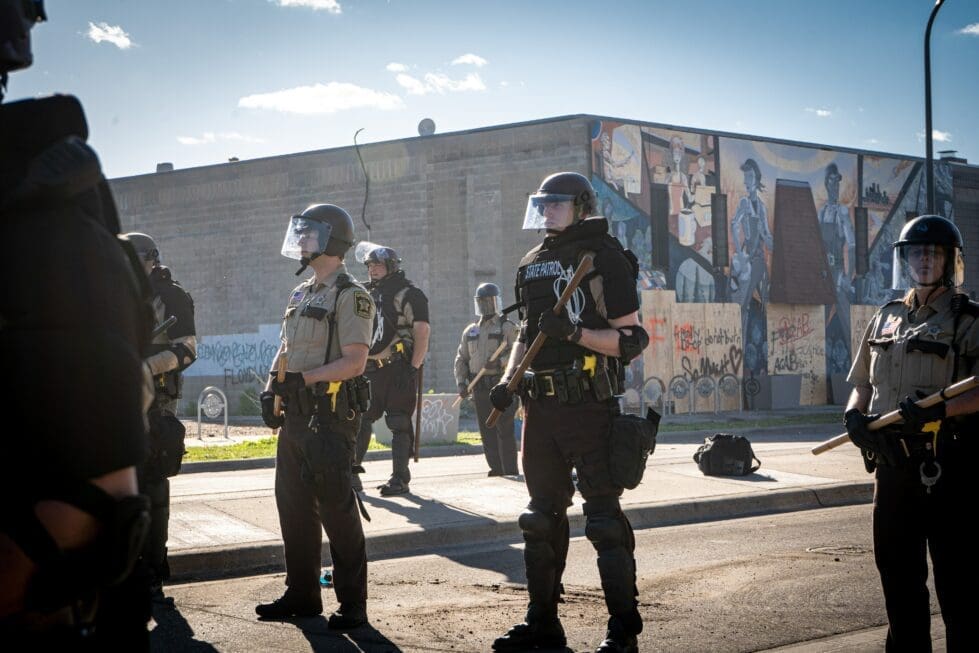

A House committee approved two bills that would seek to create greater accountability for police in Delaware.
Photo by munshots from Unsplash.
Despite opposition from police reform advocates and one vocal Democrat, two bills that add accountability and transparency for Delaware police officers easily passed the House Public Safety & Homeland Security Committee Wednesday.
House Bill 206, sponsored by Rep. Kendra Johnson, D-Bear, would change the Council on Police Training to the Police Officer Standards and Training Commission, and would expand it from 16 to 17 members.
Of those members, there would be three governor-appointed public members to the commission, up from two. One would have to be a religious leader experienced with re-entry issues for the incarcerated. The other two must have been impacted directly or have immediate family members or caregivers impacted by the criminal justice system.
It also requires that the commission must ensure that all officers of every police agency be accredited by the Police Accreditation Commission.
HB 206 passed with three favorable votes, four on its merits and one unfavorable.
House Bill 205, sponsored by House Majority Whip Melissa Minor-Brown, would require an investigating agency to prepare a detailed report of its internal investigation and publicly release it for any case involving an officer:
- Firing a gun.
- Using force that causes serious physical injury.
- Having a sustained case of sexual assault having been committed by the officer from an internal report.
- Having a sustained finding of domestic violence having been committed.
- Being dishonest related to a crime or misconduct by another officer.
Those records must be preserved for at least 25 years and would be posted on the Police Officer Standards and Training Commission’s website.
The bill passed with five favorable votes and three on its merits.
Related Story: State Police mark 100 years of serving Delaware
Jason Hatchell, public information officer with the Delaware State Police, declined to comment on the legislation before they are signed into law because it may change during the legislative process.
Expanding council, accreditation
Every police agency in the state would need to be accredited by the Delaware Police Accreditation Commission by July 1, 2028.
Rep. Ruth Briggs King, R-Georgetown, said she appreciates House Bill 206, but thinks smaller police departments may struggle under the mandatory accreditation requirement.
There are several Sussex County departments with only two or three officers, she said.
“For those small municipal departments that lack the funding or they lack the staff to come up with this,” Briggs King said. “If they’re going to take a course or go through accreditation, who is covering them while they do that?”
Richard McCabe, chief of New Castle City Police, said he was part of a three-person agency that went through accreditation.
“So I hope that alleviates any concerns about the smaller agencies being able to manage that,” he said.
Rep. Cyndie Romer, D-Newark, said she was concerned about the heavy presence of police on the standards and training council.
“You could theoretically have every member of the commission be a police officer or a former police officer,” she said.
HB 206 also would give the council the authority to issue subpoenas for evidence needed at a hearing, would increase the commission’s number of annual meetings from two to four, and require a public comment period during the meeting.
The council oversees allegations of police officer misconduct and conducts hearings for possible suspensions or de-certifications.
The bill would clarify that decisions of disciplinary panels are public documents.
More people spoke against the bill than for it.
Representatives of the Metropolitan Wilmington Urban League and Delaware NAACP, asked for the bill to be tabled so they had more time to study it and because there was no guarantee that every member of the board would not be an officer
Marci Scott Marcia, executive director of the Delaware League of Local Governments, praised the bill because of improvements it will bring.
Romer said there’s something wrong with how many people in the community spoke against the bill, and how many police officers spoke in favor of it.
When we see a law enforcement transparency bill, and we see such a heavy level of support from the police and so many organizations in the community … who feel left out in the process and feel as if they haven’t been part of it,” Romer said. “I feel like something’s wrong.”
Rep. Johnson said the bill isn’t perfect, but they need to pass something.
“It’s time for us to move the needle,” Johnson said. “We need to get this done…and what we have here today is transformative. It may not be perfect … but I ask the committee members to release this so that we can at least take a step towards getting better.”
In a fiscal note for the bill, it estimates $142,200 in one time costs and $483,616 in recurring costs for the 2024 fiscal year, $633,812 in recurring costs for the 2025 fiscal year, and $646,081 in recurring costs for the 2026 fiscal year.
Expanding public knowledge
Minor-Brown said House Bill 205, provides better accountability for law enforcement.
“There’s this public notion that we haven’t done anything since June 2020. I’m insulted by that. Extremely insulted by that,” Minor Brown said. “Meanwhile, I know that I’ve worked with many of the advocates even in this room, to tackle police reform head on, and passed several laws since then.”
The bill states that police departments may provide information about investigations of officer misconduct to victims or complainants.
Romer said she had an issue with the bill stating police may release the outcome of investigations but were not required to.
Minor-Brown said she would introduce an amendment to change the wording to say “shall.”
The bill would also require law enforcement agencies to submit each year detailed narratives to the Criminal Justice Council, which would publicly post those public reports.
Those reports would have to include:
- The number of complaints relating to police misconduct that departments received each year.
- The number of investigations by the department each year and the number of complaints that didn’t have an investigation.
- The number of investigations that resulted in a finding of misconduct.
Under HB 205, the Department of Justice would have to give defense attorneys who request them all records relating to sustained findings of misconduct by an officer who participated in the investigation or prosecution.
Keandra McDole, whose brother, Jeremy McDole, was killed by police in 2015, said the bill should be tabled because it doesn’t provide any transparency.
“This does not represent the community,” she said. “I’m speaking on behalf of all impacted families. There’s absolutely no transparency, absolutely no accountability to the public.”
Rep. Franklin Cooke, D-New Castle/Minquadale, said he was upset about public comments because several of those offering comments were on the Law Enforcement Accountability Task Force that covered the issues outlined in the bills.
“I don’t care what color you are, White, Black, green, yellow, Latino, African American, I don’t care what you are,” Cooke said. “Right is right and wrong is wrong…Let’s move forward with this. Let’s get some more work on it, I’m for that. But let’s move forward with this.”
A fiscal note for the bill anticipates $65,836 in recurring costs and $3,500 in one time costs for the 2024 fiscal year, $89,537 in recurring costs for the 2025 fiscal year, and $91,328 in recurring costs for the 2026 fiscal year.
Share this Post



